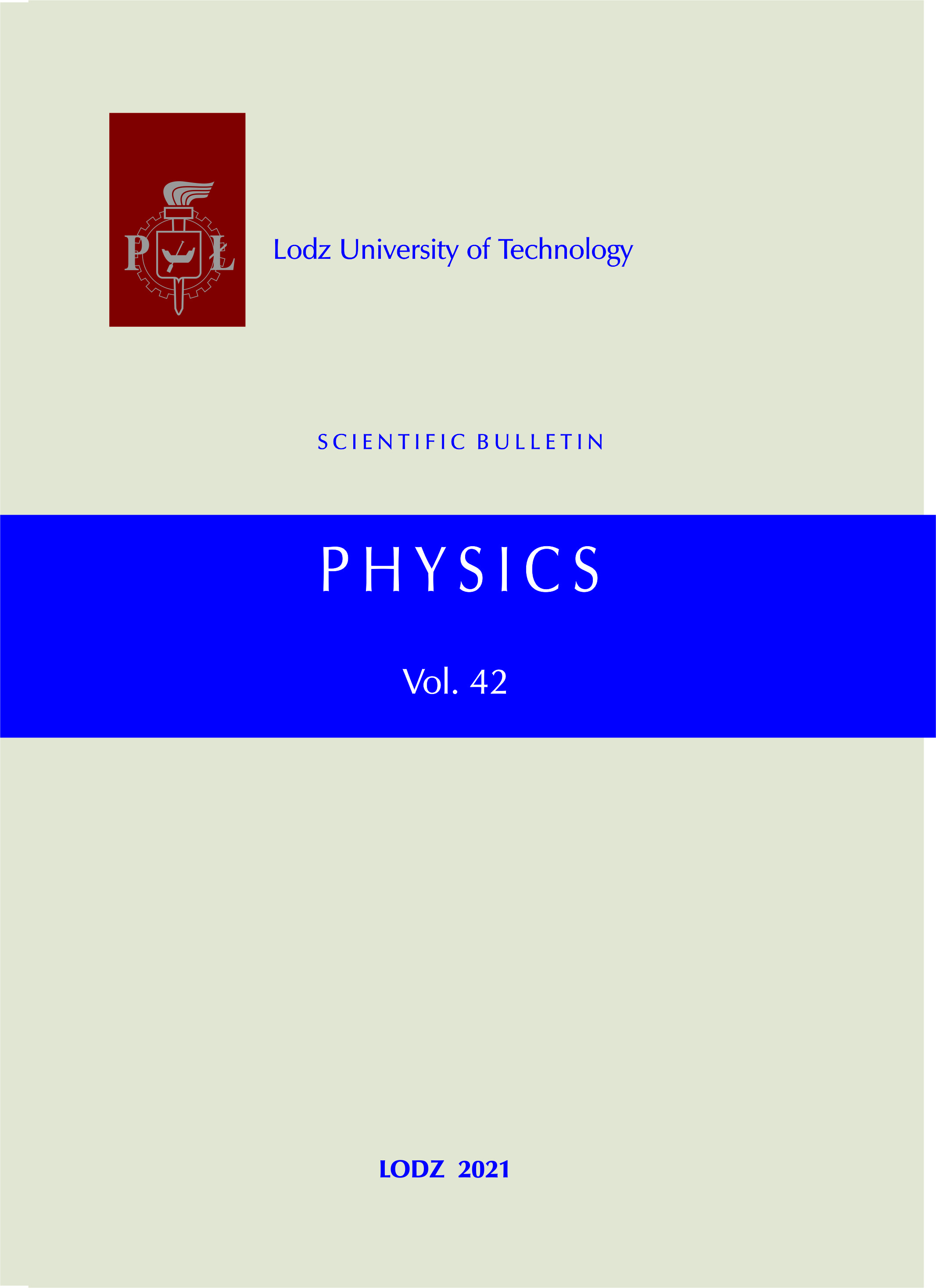Abstract
Volume conductivity of thin organic layers in contact with the ambient atmosphere depends on the volume properties and on the adsorption processes on the free surface of the layer. In order to clarify the role of the surface, experiments were carried out at a temperature close to 293 K to determine the influence of the adsorption dynamics on the change of characteristic relationships observed for the transport of electric charge in vacuum, in the ambient atmosphere and in the controlled atmosphere of the ethyl alcohol vapors. The investigations were carried out for two linear tetracyclic molecular structures, i.e. p-tetraphenyl and tetracene. These molecular systems differ in organization of the rings. The results show an increase in conductivity measured for both compounds when there are the molecules capable of adsorbing to the surface and to transfer or receive charge carriers connected with the process of diffusion or drift transport in the volume of the layer. The nature of the observed increase in conductivity proves that the hopping mechanism is present in the case of conductivity of both tested materials.
References
Loi A., Manunza I. 2005. Flexible, organic, ion-sensitive field-effect transistor. Appl. Phys. Lett. 86:103512 -103513. https://doi.org/10.1063/1.1873051
Migliore A., Naaman R., Beratan D.N., 2015. Sensing of molecules using quantum dynamics, PNAS 112:E2419-E2428. https://doi.org/10.1073/pnas.1502000112
Kania S., Kuliński J. 2011. Activation of thin layers of two aromatic hydrocarbons. Chem. Met. Alloys 4:31-37. https://www.readcube.com/articles/10.30970%2Fcma 4.0142
Warta W., Stehle R., Karl N. 1985. Ultrapure high mobility organic photoconductors. Appl. Phys. A 36: 163-170. https://doi.org/10.1007/BF00624938
Robertson J.M., Sinclair V.C., Trotter J. 1961. The crystal and molecular structure of tetracene. Acta Cryst. 14: 697-704. https://doi.org/10.1107/S0365110X61002151
Roux M.V., Temprado M., Chickos J.S., Nagano Y. 2008. J. Phys. Chem. Ref. Data, 37:1855. https://doi.org/10.1063/1.2955570
Tersigni A., Shi J., Jiang D.T., Qin X.R. 2006. Structure of tetracene films on hydrogen-passivated Si(001) studied via STM, AFM, and NEXAFS. Phys. Rev. B74: 205326-1 - 205326-9. DOI: 10.1103/PhysRevB.74.205326
Delugeard Y., Desuche J,. Baudour J.L. 1976. Structural transition in polyphenyls. II. The crystal structure of the high-temperature phase of quaterphenyl. Acta Cryst. B32:702-705. https://doi.org/10.1107/s0567740876003828
Kawaguchi A., Tsui M., Moriguchi S., Uemura A., Isoda S., Ohara M., Petermann J., Katayama K-i. 1986. Electron Microscopical Studies on p-Polyphenyls. Bull. Inst. Chem. Res., Kyoto Univ. 64:54-65. http://hdl.handle.net/2433/77139
Müllergger S., Stranik O., Zojer E., Winkler A. 2004. Adsorption, initial growth and desorption kinetics of p-quaterphenyl and polycrystalline gold surfaces. Appl. Surf. Sci. 221: 184-196. https://doi.org/10.1016/S0169-4332(03)00878-X
Kaźmierczak J., Biniak S., Swiatkowski A., Radeke K.H. 1991Interdependence of different parameters characterizing the chemistry of an activated carbon surface, J.Chem. Soc. Faraday Trans. 87:3557-3561. DOI: 10.1039/FT9918703557
Rychlicki G., Terzyk A.P. 1995. Indispesability of the use of calorimatric measurements for the description of adsorption processes in microporous systems, J. Therm. Analysis 45: 961 - 965. https://doi.org/10.1007/bf02547464
Mott N.F., Davies E.A. 1971. Electronic processes in non-crystalline materials, Oxford, Clarendon Press.
Kania S. 2010. Electrons drift mobility in amorphous anthrone layers. Sci. Bull. Physics. 31:43-50. https://doi.org/10.34658/physics.2010.31.43-50
Kania S., Kondrasiuk J., Bąk G.W. 2004. Influence of ambient atmosphere on charge transport in polycrystalline thin films of three simple aromatic hydrocarbons. Eur. Phys. J.E. 15: 439-442. https://doi.org/10.1140/epje/i2004-10060-x
Velasco-Velez J.J., Kunze U., Haas T. 2010. Co‐adsorption processes, kinetics and quantum mechanical modelling of nanofilm semiconductor gas sensors. Phys. Status Solidi A. 207:924-929. https://doi.org/10.1002/pssa.200983322
Brako R., Newns D.M. 1989. Theory of electronic processes in atom scattering from surfaces. Rep. Prog. Phys. 52:655-697. https://doi.org/10.1088/00344885/ 52/6/001
Nordlander P. 1990. Charge transfer processes in atom-surface collisions. Scanning Microscopy. 1990. 4 (21):353-370. https://digitalcommons.usu.edu/microscopy /vol1990/iss4/21
Kitaigorodsky A.I. 1973. Molecular crystals and molecules. New York, Academic Press.
Brandão F.G.S.L., Horodecki M. 2013. An area law for entanglement from exponential decay of correlations. Nature Phys. 9:721-726. https://doi.org/10.1038 /nphys2747
Radicchi F., Arenas A. 2013. Abrupt transition in the structural formation of interconnected networks. Nature Phys. 9:717-720. https://doi.org/10.1038/nphys 2761
Levitt M., Perutz M.F. 1988. J. Mol. Biol. 201:751-754. DOI: 10.1016/0022-2836(88)90471-8

